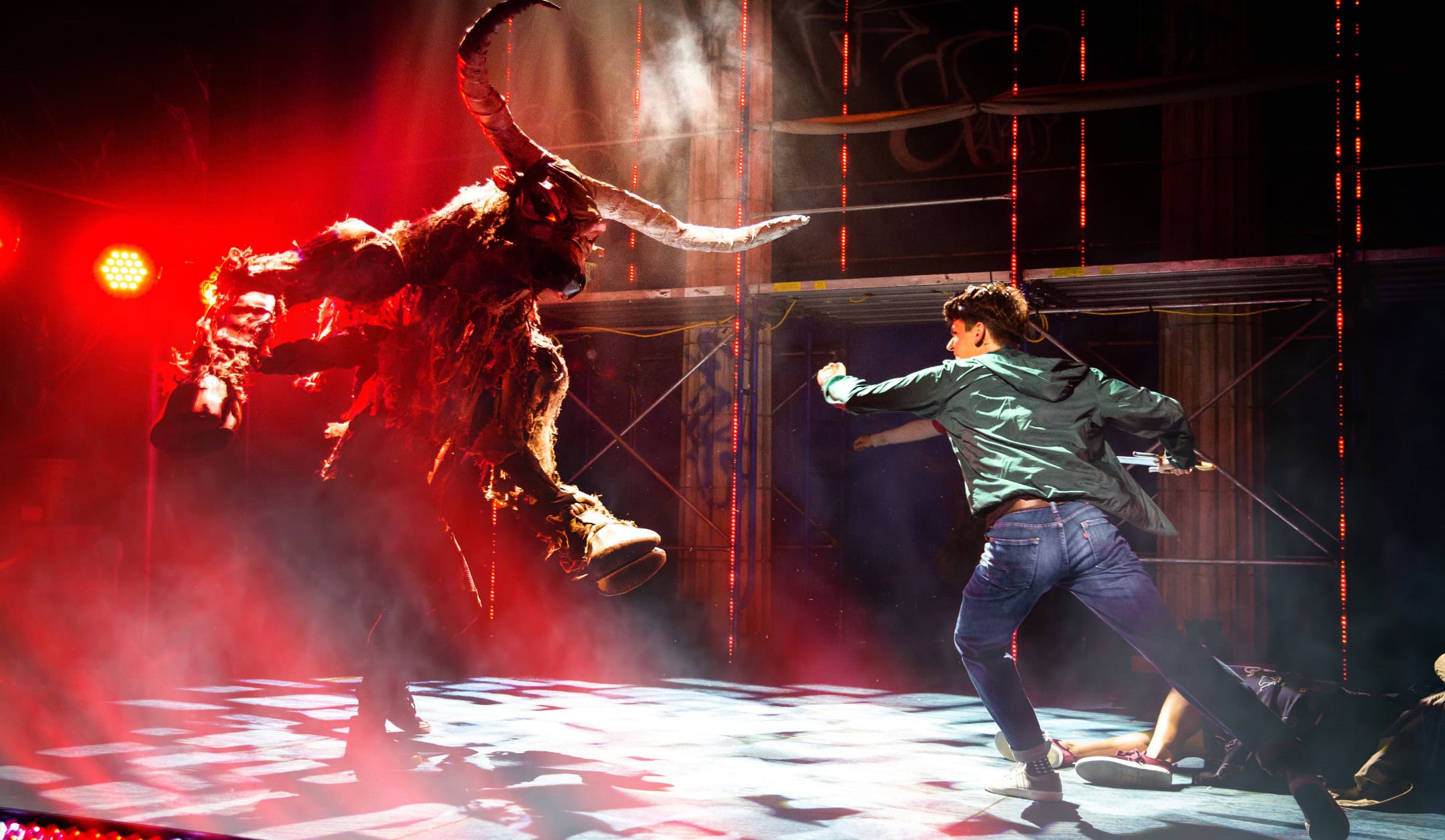
Joe Tracz is no stranger to adapting literature. On screen, he brought the words of Lemony Snicket to life as a writer on Netflix’s A Series of Unfortunate Events. On stage, he transformed two novels for Broadway, penning the book for musical adaptations of Ned Vizzini’s Be More Chill (US/UK) and Rick Riordan’s The Lightning Thief (US/UK). But Tracz’s latest journey into the world of adaptation, writing for the Disney+ series Percy Jackson and the Olympians, offered a unique opportunity: adapting the same source material to two different mediums.
We sat down with the writer to discuss reshaping the stories you love, how The Lightning Thief’s epic tale translates to theatre and television, and creative feats of mythic proportions.
You have done a lot of Young Adult fiction adaptation throughout your career. What is it about this genre that interests you?
I’ve always been drawn to stories about young people because our early years and experiences are so crucial to shaping who we are: the first time you recognized the world wasn’t always fair, the first friend who made you feel like you weren’t alone. It’s a time in your life when even small things feel huge and earth-shattering, because the emotions you’re feeling are still so raw and new. I’ve also always loved adaptation because it requires getting inside your favorite stories to find out how they work – and all the books I’ve adapted are books I loved as a reader first and foremost.
How did you first end up diving into the world of Percy Jackson?
I worked in a bookstore when the original Percy Jackson books were coming out, and I saw how many people were coming in to ask about them. I’ve always loved fantasy and mythology, so I picked them up and was instantly hooked. Percy’s voice is so unique and funny, and the way Rick blends Greek myth with modern life is so imaginative and fun… like the idea of the god of the sea going around in a Hawaiian shirt. But beneath the humor and adventure is this really potent metaphor for growing up. When we’re young, we often feel like our parents are gods… what if they actually were? How do you find your place in a world someone else made? How do you stand up to authority when that authority is ancient, all-powerful, but wrong?
What is it about Percy’s adventure that makes it the right fit for the stage? Who do you feel his story is for?
On the surface, The Lightning Thief doesn’t seem an obvious candidate to turn into a musical. You don’t see a lot of YA fantasy on Broadway. And in the books, Percy is very much the kind of kid who would rather fight a monster than sing a song about it. But to me, musical theatre thrives on emotions so big, they can’t be expressed by words alone. And the characters in The Lightning Thief are young people coming of age while grappling with world-shaking, mythic forces – what could be bigger than that?
What was your philosophy in adapting this subject matter? What was most important to you?
We knew fans would be coming to see their favorite characters and iconic scenes. So we felt a responsibility to be as faithful as possible. Still, The Lightning Thief contains an enormous amount of story. Our solution was to make it a musical. Music can instantly conjure up an emotion, take you on a journey, or show you what’s inside someone’s head. And Rob Rokicki, my incredible composer-lyricist, was adamant that, if these characters were going to sing, they had to sing in musical genres that felt authentic to their identities. That meant angsty emo-tinged rock for Percy, a brassy showtune number for Mr. D (aka Dionysus, the god of theater) and disco for the Underworld… because disco is dead.
Tell us about the process of adapting the novel into the musical. What opportunities did you find most interesting, or challenges did you face?
When we first wrote the show, it was designed to tour to schools and libraries, so we had to keep the cast small and the set minimal. That forced us to be inventive – to embrace the playfulness of double-casting, and to find imaginative ways to suggest magic and monsters. For example, as the son of Poseidon, Percy can control water, but we knew we could never use real water on stage. As always, the book gave us the solution. One of the first times Percy uses his ability is when he accidentally makes a toilet explode… so our director Stephen Brackett had the idea to represent water by hooking a toilet paper roll to a leaf blower. When Percy summons a tidal wave to defeat Ares, he’s literally toilet-papering the god of war… which feels like the kind of thing that Percy Jackson would find hilarious.
The Lightning Thief provides so many fun opportunities for theatres to be creative in crafting the magic and monsters of Greek mythology. Can you tell me about some of highlights you have witnessed?
While our original production had only seven actors, I love seeing schools perform the show with a huge cast, where every person on stage gets something to do. I read about one production that even cast someone to play the lightning bolt! The titular role! (And for any kid disappointed to be cast as a tree, well, Percy fans know that the tree is in fact a very significant part.) But really, the best thing about having the show out there is knowing how much these characters mean to people around the world. With every production, people are seeing their heroes come to life – or playing their heroes themselves.
Tell us about your role with the Disney+ series Percy Jackson and the Olympians.
The series was a dream to work on. How many writers get to adapt the same book twice, in two totally different mediums? I was a part of the first season writers’ room, along with Rick Riordan and his wife Becky, our incredible showrunners Jon Steinberg and Dan Shotz, and a small group of brilliant minds that they assembled. Everyone would pitch ideas, we’d have passionate conversations about our favorite characters… It was like the most fun book club you could imagine.
We would love to hear about the process of adapting the same material twice, working in different mediums. How did the process compare from novel to stage versus novel to screen?
While the musical covers the entire story in under two hours, the TV adaptation has eight episodes, which gives the series a lot more time to live in scenes and dig into characters. In the musical, Percy gets his quest at the end of act one – aka the halfway point. In the TV series, Percy gets his quest at the end of episode two… and there are six more episodes to go. In fact, both episodes I co-wrote are centered around stories that that the musical covers in a single road trip song!
What can fans of the book and musical expect from the Disney+ show?
Both the TV series and the musical are incredibly faithful adaptations, made by people who know these books down to their bones. But there will be surprises for fans too. The books are limited to Percy’s first-person POV, while the TV show can cut away to scenes or events that Percy isn’t present for. And with Rick and Becky in the writers’ room, we had the opportunity to expand on some aspects of the story that they had been thinking about for a long time, and even introduce some characters who book readers might not expect to see turn up so early.
What else should we know about the upcoming series?
The cast is incredible, especially Walker, Leah and Aryan (who play Percy, Annabeth and Grover, respectively). Also, while I love seeing productions of the musical bring the monsters to life with clever stagecraft, I have to say that it’s extremely cool to see those monsters fully realized by some of the best VFX teams in the world. You never thought a minotaur wearing underpants could be so scary.
For more information about bringing The Lightning Thief: The Percy Jackson Musical to your stage, visit Concord Theatricals in the US and UK.

Newly Available for Licensing – January 2026 (UK)

Newly Available for Licensing – January 2026 (US)

